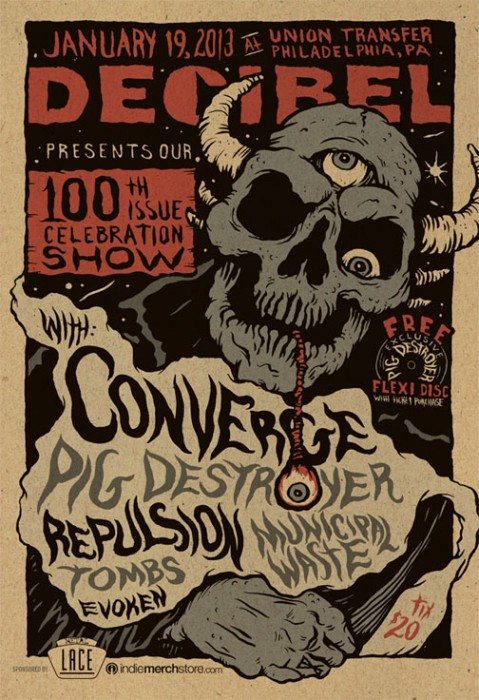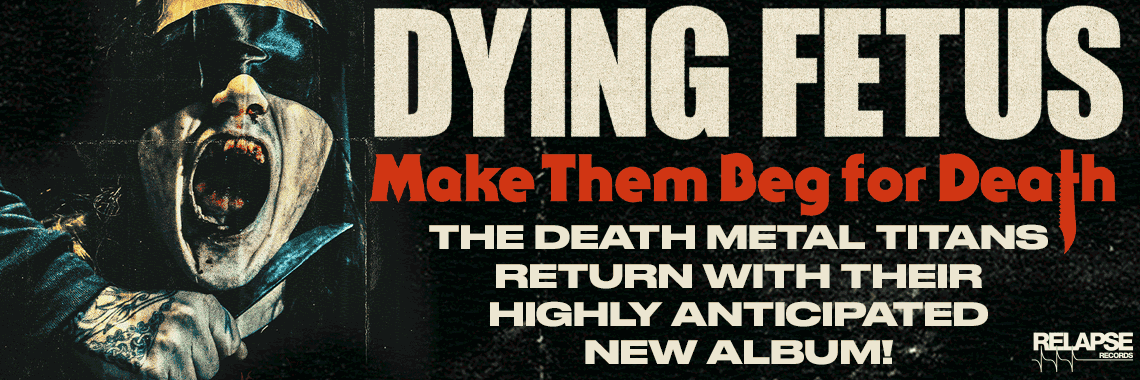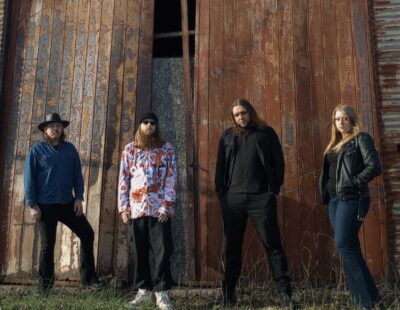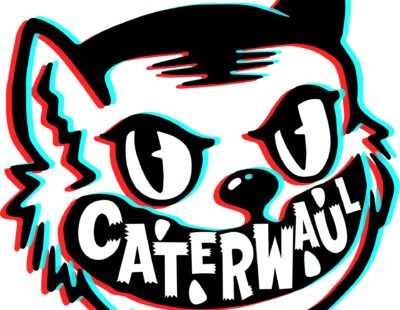On January 19th, Decibel will celebrate a century of extremely extreme issues at Philadelphia Union Transfer in exalted company: four-time cover stars Converge; swine-ablating grindhogs Pig Destroyer; crossover champs Municipal Waste; Repulsion (be still, beating heart); 2011’s AOTY artists Tombs; and funerealy epic doom titans Evoken.
It’s the perfect Decibel storm, a line-up of bands whose ouevre is guaranteed to test both the venue’s structural integrity and the cervical vertebrae of all those in attendance. But it’s a Saturday night, plenty of time to recover before Monday morning; and we’re accepting no excuses for non-attendance. Tickets are selling out fast but you can still buy some HERE.
Now that you’ve done the sensible thing and bought your tickets, here’s Evoken’s drummer Vince Verkay to talk about about life in the band since the departure of founding member/guitarist Nick Orlando, the recording of the epic Atra Mors, and overcoming stagefright.
Is it important to your writing process that you shut out the outside world? You’re just back from playing shows and you didn’t even take a laptop with you on the road: It’s like it’s Evoken-time, and that’s all that matters.
Vince Verkay: “Oh definitely. I mean we try to avoid any distractions, just shut out the world. You just wanna keep that initial train of thought that you had before writing or entering the studio, or even being on tour. Something that affects you, whether reading a book, or a movie, or you think back to a certain time period in your life that was difficult, and you try to hold on to that. You don’t want to have any distractions; you leave all the technology and everything, cell phones off, laptops away, everything. That’s really important.”
Atra Mors is your first LP without Nick Orlando. How did it affect writing for the album, and the end result?
VV: “The [Beneath the Frozen Soil/Evoken split] EP was Nick’s last time writing with us. Chris hadn’t joined the band by that point. You get so accustomed to the way [Nick] plays; we don’t even have to say anything to each other, we just know with a look, or he’ll just start playing something or I’ll just start playing something and immediately connect. I have that with John [Paradiso, guitars] as well, but it was really ingrained with Nick and I. And then with Chris coming into the band, the process of writing essentially remained the way it was prior, but the difference with Chris is that he is a very, I’d say into melodic doom more than Nick was; he’s into Katatonia, October Tide, bands like that. As far as affecting the music, it actually injected new energy into the band; I’m not saying that it was becoming stale with Nick because that was not the case at all, but it allowed us to try different things, try going in a different direction with the music a little bit more. It was exciting before, but this was more exciting like when we first formed.”
. . . Exciting because there was always that feeling that maybe you could fail.
VV: “Right, exactly. It really led us to expand a bit more on the writing, the guitars, and it was our first full-length with Don [Zaros, keyboards] and Dave [Wagner, bass] as well, so everybody had their influences injected into the music and when you have all these different genres of music that basically feed into the way we are writing now it really allowed us to get the creative ball rolling. It really had a positive effect on the writing for this album and the way this album came out.”
The album is about life during the plague-era, right?
VV: I really felt that this album represented that time period, and the theme was dirty, depressive, oppressive, it was a time in human history that nobody wants to experience again. You have the sadness of complete generations being wiped out, families completely ripped apart by something that they could not understand, and they could not grasp how to rid themselves of this nightmare.
As bleak as it is, there is maybe more lightness to your sound now, certainly it feels even more epic. Do you hear this?
VV: “Yeah, actually it sounds a little bizarre, but it added a little light to the darkness that the music usually brings out, that element, that atmosphere. I almost feel that it gave the music a little more of an epic touch to it. We’ve had epic moments before but this really allowed it to open up. And it was positive all around; I mean Chris really brought an element to the band that we were really happy with. He has injected new life into the band.”
Did it come together quickly?
VV: “It took a lot longer this time. We started recording the album in November 2011; we didn’t finish until May 2012, and there were a few variables. One aspect that really delayed things was the studio. What we try to do is, we always try to book time weekend after weekend, week after week, so we can continue moving along with the process. But this time we had the studio booking bands in between our recording sessions, and they would run over and cut into the time that we were supposed to have, so we got bumped, or the studio would forget to schedule a date, and when we call to schedule the weekend it’d be like, ‘Oh, I forgot to put you in the book’. It delayed things as far [but] as the process I guess you could say it was less stress, and the reason why there was less stress was because with Profound Lore they really allowed us to operate the way we wanted to operate; there wasn’t so much pressure to get things done and finish to a deadline. We had a deadline but it wasn’t pressed on us so we had to rush things along. The ideas were really flowing. We would have ideas when we are about to go into the studio.
Did you do much pre-production?
VV: We rehearse everything … A lot. And what happened was that when we got into the studio, because we had new members in the band, the ideas kept flowing and moving and really allowed us to be free with our creativity. Even though it took us a long time to record it, as far as the recording process went it was really smooth. It gave us the opportunity to really focus on what we were doing without thinking about time restraints or limits or having things done… It was really, really exciting. I can’t put it into words; it was an experience that we haven’t had for such a long time, new ideas getting injected into the band.”
How did you get Brian Sanders to play cello on the record: was he a friend of yours?
VV: “We had no contact with him prior to recording the record. It was something that the studio, Steve [DeAcutis] the engineer [set up]. We said to Steve that we needed someone to play the cello on the album. It was something that we haven’t done since Antithesis of Light and we wanted to go back to that. Brian came down and we wrote the music for him and he’d never heard the music before, knew very little about Evoken, just what he’d heard online prior to coming into the studio. We wrote everything out for him and he gave it a listen a couple of times and off he went. He is a really cool guy, a really talented musician, and we spoke with him about working together in the future. It’s something we’ve also talked about with working him into a live situation, if that’s possible. He agreed to all of it. It’s his first recording with us but it’s definitely not going to be his last.”
You’ll be playing our 100th Issue show in the New Year, you’ve been playing a lot lately. Do you now see yourselves as a live band now? In the past, Nick had said that he didn’t like playing live. Has that changed?
VV: “Absolutely. That was something that was basically Nick; He really didn’t enjoy playing live for a few reasons. He felt that, at the time, years ago, we were hauling all the equipment, hauling it to where we were playing and playing to 10, 15 people, and we weren’t able to have the sound that we wanted, and this was really something that wasn’t gelling with what his idea was of what we wanted to do live. The rest of us, we really enjoyed playing live, but shared the same frustrations as him. But as time moved on, we we got more experienced in playing live, figuring out how we could attain the certain elements that we were looking for in a live situation. We started to have a grasp on those things and those started to improve as well as the turnouts. The live situation became more and more enjoyable, even though we were as nervous as all hell when we went on stage! Nick, still, even before the end when he left the band, he still wasn’t someone who enjoyed playing live; the rest of us started to embrace it more and more, to the point where now we love playing live.
Do the songs change when you play them live; are they more intense because of those nerves, the volume, etc?
VV: “There’s something about playing those songs live and creating that sound in a live situation as opposed to on-record that gives you a sense of power when you’re on stage, and you really feel the notes when you are playing them, you really feel the atmosphere. Now we actually have a sound engineer for our live setting, so we’re not just leaving it in the hands of just whoever happens to be working that night behind the board. We have someone who understands the music, understands what we are looking for, and he’s able to give us that [confidence]. If you have someone behind the board that you don’t know you have that concern at the back of your mind, ‘I wonder if this sounds like shit?’ There’s less stress as far as that’s concerned; the turnouts are getting much better; it’s really more enjoyable for us now.”
Was it a conscious decision to be more epic? The album sounds really grand.
VV: “I don’t wanna say that it’s better, but you could say for me personally it’s better. I think on previous albums, like I say, it was there but it was sparse. Now that we’ve added more of that element into the music each and every time we play it it is more enjoyable. It makes the hair stand up on the back of your neck, it really gives you that sense that we’re creating something here that we’re really happy with, and it’s really allowing us to go in different directions as far as what we are trying to accomplish. It shows to us that to create that kind of music it doesn’t always have to be confined to one thing; you can expand upon what you are doing to bring new atmospheres into the music. It’s becoming more enjoyable playing those songs, and I know every band when they come out with a new album those are the songs they enjoy playing because they’ve played the others for so long, so many times, they still enjoy them but they’re not the new songs. But for us the new songs are more than just new songs; they are a new chapter in the band and we really feel it when we are playing onstage.”
**Evoken on Facebook**
**Evoken’s Atra Mors is out now through Profound Lore. Order it HERE.**







